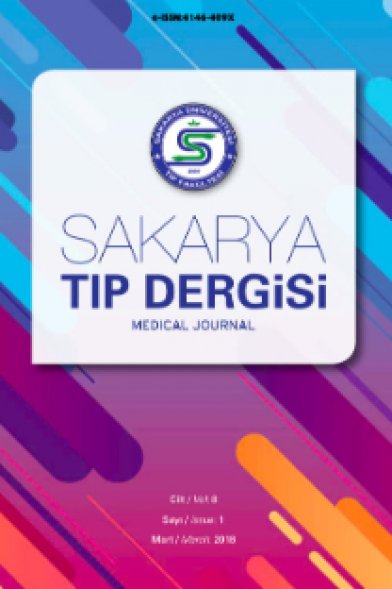Acil Servise Başvuran ve Bilgisayarlı Tomografi Çekilen Çocuk ve Ergenlerde Splenül Sıklığı
Abdomen, aksesuar dalak, kontrastlı bilgisayarlı tomografi, kontrastsız bilgisayar tomografi, pediatri, splenül
Splenule Frequency on Computed Tomography Scans in Children, Presenting to The Emergency Department
Abdomen, accessory spleen, contrast enhanced computed tomography, non-contrast enhanced computed tomography, pediatric, splenule,
___
- REFERENCES 1. Arkuszewski P, Srebrzyński A, Niedziałek L, Kuzdak K. Accesory Spleen-Incidence, Localization and Clinical Significance. Comparative Professional Pedagogy. 2010;9(82):510-514.
- 2. Depypere L, Goethals M, Janssen A, Olivie F. Traumatic rupture of splenic tissue 13 years after splenectomy. A case report. Acta Chirurgica Belgica. 2009;109(4):523-526.
- 3. Pandey SK, Bhattacharya S, Mishra RN, Shukla VK. Anatomical variations of the splenic artery and its clinical implications. Clin Anat. Sep 2004;17(6):497-502. doi:10.1002/ca.10220
- 1. Arkuszewski P, Srebrzyński A, Niedziałek L, Kuzdak K. Accesory Spleen-Incidence, Localization and Clinical Significance. Comparative Professional Pedagogy. 2010;9(82):510-514.
- 2. Depypere L, Goethals M, Janssen A, Olivie F. Traumatic rupture of splenic tissue 13 years after splenectomy. A case report. Acta Chirurgica Belgica. 2009;109(4):523-526.
- 3. Pandey SK, Bhattacharya S, Mishra RN, Shukla VK. Anatomical variations of the splenic artery and its clinical implications. Clin Anat. Sep 2004;17(6):497-502. doi:10.1002/ca.10220
- Yayın Aralığı: 4
- Başlangıç: 2011
- Yayıncı: Sakarya Üniversitesi
Ayla BATU ÖZTÜRK, Derya YETKİN, Nail Can ÖZTÜRK
Acil Servise Başvuran ve Bilgisayarlı Tomografi Çekilen Çocuk ve Ergenlerde Splenül Sıklığı
Obezitenin Medikal Tedavisinde Liraglutide Etkinliğinin Araştırılması
Mustafa ALTINKAYNAK, Yağmur GÖKSOY SOLAK, Naci ŞENKAL, Yavuz Burak TOR, Timur AKPINAR, Murat KOSE
Sağlık Okuryazarlığı Müdahale Çalışması: Eczacılık ve Eğitim Fakültesi Örneği
Selin TUNALI ÇOKLUK, Sinemis ÇETİN DAĞLI
Filiz BİLİR, Didem BATMAN, Aydın ÇORAKÇI, İzzet YÜCESOY
Aysel TOÇOĞLU, Emine Ülkü AKÇAY, Ayfer ERDOĞAN ALTAŞ, Sabah TUZUN, Burcu DOĞAN, Emel GÖNÜLLÜ
An Assessment of 25-hydroxyvitamin D and Inflammation in Diabetic Patients with Mild COVID-19
Almila ŞENAT, Soner YEŞİLYURT, Osman ERİNÇ, Ayşegül OĞLAKÇI İLHAN
İsmail DİLEK, Zehra Hilal ADIBELLİ, Ali Murat KOC, Gamze DAL, Esra KOÇ, Asuman Argon ARGON
